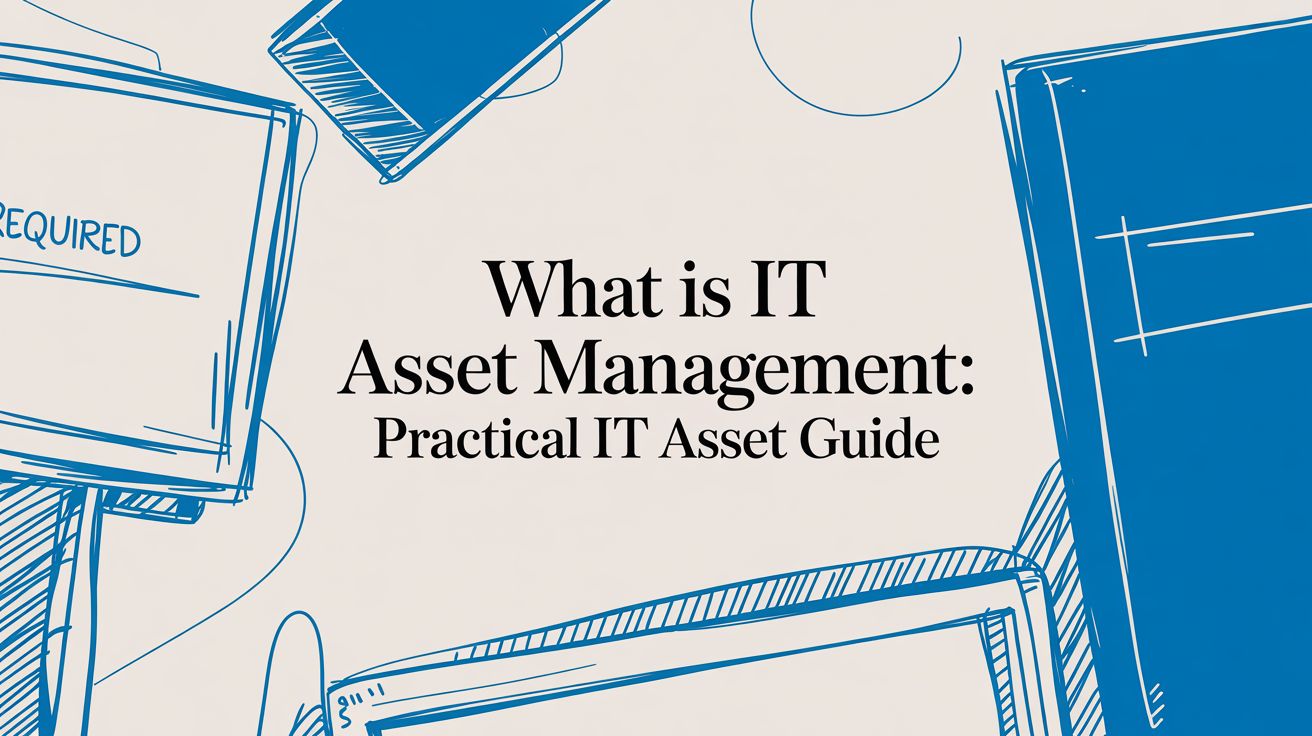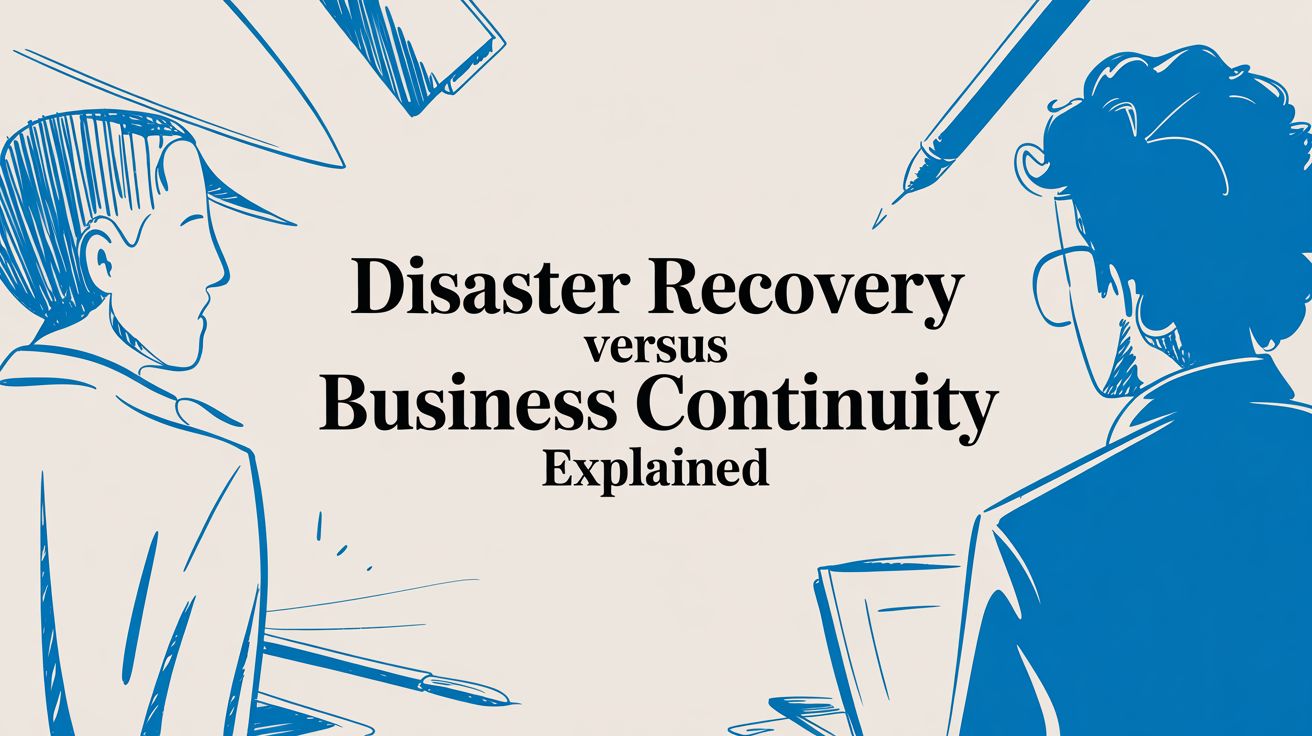What Is Managed Security Services for Small Business?
Think of Managed Security Services (MSS) as having an elite team of digital bodyguards for your business. It's a way to outsource your most critical cybersecurity needs—like 24/7 monitoring, threat detection, and rapid incident response—to a dedicated group of experts. For a small or mid-sized business in Dallas or Memphis, it’s like getting a Fortune 500 security team for a fraction of the cost.
What Proactive Cybersecurity Looks Like
Let's use an analogy. Imagine your business is a fortress. A traditional, reactive IT approach is like calling a repair crew after a breach has already happened. You’re left scrambling to fix the damage, recover lost data, and figure out what was stolen.
A Managed Security Services Provider (MSSP), on the other hand, acts as your vigilant security detail. They’re constantly patrolling the perimeter, watching every access point, and neutralizing threats long before they can cause harm. That's the core difference: shifting from reacting to problems to actively preventing them.
For a small business, this isn't just a technical upgrade; it's a fundamental change in strategy. Instead of finding out about a data breach from a customer days later, you have specialists watching your network around the clock, ready to act on the slightest anomaly.
From Reactive to Strategic Security
This proactive stance brings serious, immediate benefits to your day-to-day operations:
- Prevents Costly Downtime: By catching and neutralizing threats early, an MSSP prevents the kind of crippling downtime that follows a successful ransomware attack or data breach.
- Guards Business Continuity: With constant monitoring and a solid incident response plan, you keep operations running, even when a potential threat emerges. This is the foundation of a real business continuity strategy.
- Frees Up Your Internal Team: Let your team focus on driving business growth. An MSSP handles the complex security work and alert fatigue, allowing your staff to be more productive.
It’s important to understand the distinction here. While many Managed Service Providers offer security, a true MSSP lives and breathes it. This is their sole focus, bringing a much deeper level of expertise and more advanced tools to the table.
To really get a handle on this, you have to know where your responsibility ends and the provider's begins, especially in the cloud. A great resource for this is the AWS Shared Responsibility Model in a security context, which clearly defines who is responsible for what, ensuring no gaps are left in your defenses.
In-House IT vs Managed Security Services
Deciding between keeping security in-house and partnering with an MSSP can feel daunting. This table breaks down the core differences in a nutshell.
Ultimately, an in-house team is often stretched thin, trying to be a jack-of-all-trades. An MSSP, however, brings specialized knowledge and a singular focus on protecting your business, giving you a level of security that’s tough to build on your own.
The Core Services That Protect Your Business
So, what do managed security services actually do? Think of it as a layered defense system, with each component working together to guard your company’s digital assets. It's less like a single firewall and more like a dedicated security detail, with each specialist playing a crucial role.
The absolute cornerstone is 24/7 Threat Monitoring and Detection. This is your team of digital sentinels who are always on watch. They never sleep, never take a coffee break, and never go on holiday. Using sophisticated tools, they keep an eye on your network around the clock, looking for anything out of the ordinary—like a login attempt from a strange location at 3 AM or suspicious data transfers. That constant vigilance is what makes the difference, because cybercriminals don't stick to a 9-to-5 schedule.
Proactive Defense and Advanced Tools
Next up is Vulnerability Management. If threat monitoring is the guard on the wall, this is the engineering crew that constantly inspects the wall for cracks. Instead of just waiting for something to go wrong, this service actively scans your systems for weak spots—an unpatched piece of software, a poorly configured server—and remediates them before an attacker can exploit them. A solid firewall is a key part of this, and if you want to dig deeper, our guide on the best firewalls for small business is a great place to start.
To deal with today's evolving threats, an MSSP brings serious firepower to the table:
Endpoint Detection and Response (EDR): This is worlds beyond old-school antivirus. If a malicious file lands on an employee’s laptop, EDR doesn't just quarantine it. It actively tracks the file's behavior, can automatically isolate that machine from the network to stop the spread, and gives security analysts the intel they need to respond instantly.
Security Information and Event Management (SIEM): Imagine a central command center for all your security data. That’s a SIEM. It aggregates log information from your entire IT environment—servers, firewalls, workstations, and cloud apps like Microsoft 365—and uses powerful analytics to connect the dots and spot the subtle patterns of a coordinated attack.
This infographic does a great job of showing the difference between what a typical in-house IT team handles versus the specialized focus of an MSSP.

As you can see, an MSSP is built from the ground up with a security-first mindset and specialized tools, whereas an internal IT team is often juggling security with a hundred other operational tasks. Top-tier providers take this a step further, aligning their practices with global standards like ISO 27001 and AI-powered risk detection to stay ahead of emerging threats.
When these core services work in harmony, they create a layered defense that’s far stronger than any single solution.
Why Proactive Cybersecurity Is No Longer Optional

It wasn't long ago that most small business owners thought they were flying under the radar. The common belief was, "We're too small for cybercriminals to care about us." That reality has been turned on its head. Today, small and mid-sized businesses (SMBs) aren't just targets; they're often seen as the easiest targets because they typically lack the fortress-like security of a massive corporation.
The rise of remote work and the rush to cloud platforms like Microsoft 365 have drastically expanded what we call the "attack surface." Think of it like this: your business used to be a single, physical office with a locked front door. Now, your "office" includes every employee’s home network, every personal phone checking work email, and every cloud app you rely on. Each of those is a new potential entry point for an attacker.
The New Reality for SMBs
With your security perimeter stretched so thin, the old "break-fix" approach to IT is a recipe for disaster. Simply waiting for something to break is no longer an option when a single ransomware attack can shut you down for good. This is why understanding network security best practices has become a critical job for every business leader, not just the IT department.
This sense of urgency is driving a huge shift in the industry. The demand for Managed Security Services isn't just growing—it's exploding as business owners grapple with this new, very real threat.
Proactive security isn't just another line item in the IT budget anymore. It’s a core investment in keeping your business running, maintaining your customers' trust, and ultimately, ensuring your company survives. Neglecting it is like leaving the front door of your shop unlocked all night and just hoping for the best.
This market boom tells the story. The global managed security market is on track to hit an incredible USD 138.84 billion by 2035. This isn't just a trend; it's a fundamental change in how businesses operate. You can see the scale of this shift for yourself in recent market projections. For your business, this means one thing: investing in protection isn't an expense—it's a non-negotiable part of your strategy.
The Business Case for Managed Security
Let's get down to brass tacks. Beyond all the technical jargon, what’s the real-world value of managed security? For small businesses in Dallas and Memphis, it almost always boils down to one thing: return on investment.
The most straightforward way to look at it is through your budget. Hiring just one qualified, in-house cybersecurity expert can easily set you back well over six figures a year when you add up salary, benefits, and the constant need for training to keep their skills sharp.
In contrast, partnering with a Managed Security Services Provider (MSSP) gives you access to a whole team of specialists for a predictable monthly fee. This flips a huge capital expense into a manageable operational one. Our guide on IT managed services digs deeper into how this model helps businesses get a handle on their costs and budget more effectively.
Beyond Cost Savings to Strategic Advantage
Think of it like this: having a single in-house expert is like having one family doctor on call for every possible medical issue. An MSSP, on the other hand, is like having an entire hospital of specialists—from network surgeons to threat intelligence analysts—ready to go 24/7. That level of expertise is something most small to mid-sized businesses just can't build on their own.
The real value isn't just in saving money on salaries; it's in gaining immediate access to an enterprise-grade security team that can handle any threat, at any time.
And what about compliance? For businesses that handle sensitive information, trying to navigate standards like HIPAA or PCI DSS can feel like a full-time job. One wrong move can lead to massive fines and completely tank your reputation.
An MSSP takes that weight off your shoulders. They implement and manage the right security controls, ensuring you stay compliant and have the documentation you need for audits. This frees you up to focus on your core business. It’s no wonder so many U.S. businesses are turning to this model to manage their risk; you can discover more insights about this growing trend and see why it’s catching on.
How a Ransomware Attack Was Stopped in Its Tracks

Technical definitions are useful, but seeing managed security services work in a real-world crisis truly shows their worth. Let's walk through a scenario with a mid-sized accounting firm in Dallas. It's a perfect example of what separates a minor hiccup from a business-ending disaster.
It was a busy Tuesday afternoon, and everything started with a single, innocent-looking email. An employee in the billing department got a message that appeared to be a routine payment inquiry from a familiar vendor. It included a link to view an "invoice." The employee clicked it.
In that split second, a sophisticated strain of ransomware tried to execute.
Without a managed security service provider (MSSP) on their side, this story would have ended in encrypted files, panicked phone calls, and a huge ransom demand. But that’s not what happened here.
The Layered Defense in Action
Instead of chaos, a coordinated, automated defense system kicked in immediately. This is precisely what managed security services are built for—turning a potential catastrophe into a contained, manageable event.
Here’s a step-by-step look at how the attack was shut down in minutes:
Endpoint Protection Strikes First: The instant the malicious code tried to run on the employee's computer, the advanced Endpoint Detection and Response (EDR) agent shut it down. Think of this as the first-responder on the scene, stopping the ransomware from getting a foothold.
The SOC Gets an Instant Alert: At the same time, the EDR tool fired off a high-priority alert to the 24/7 Security Operations Center (SOC). The security analysts immediately saw the blocked execution attempt and the strange network traffic the malware was trying to create.
The Device is Swiftly Isolated: Within minutes, the SOC team remotely quarantined the compromised workstation from the rest of the network. This was like slamming a fire door shut—it ensured the threat couldn't spread to other computers or, crucially, the firm's main servers where client data was stored.
The outcome was a night-and-day difference from what could have been. Instead of weeks of downtime and catastrophic financial loss, the accounting firm experienced a minor, contained incident with zero data loss and zero business interruption.
The employee’s computer was quickly wiped and restored from a clean backup, and business carried on as usual. This client story is a perfect illustration of proactive, multi-layered security. It’s not about if a threat will appear; it's about having the right team and tools ready to stop it cold when it does.
Choosing the Right Security Partner for Your Business
Picking a security provider is one of the most critical decisions you'll make. This isn't just about buying a service; you're handing over the keys to someone who will guard your company's future. The goal is to find a partner that feels like a natural extension of your own team.
That means you have to look past the sales pitch. One of the biggest factors? Local experience. For businesses in places like Dallas and Memphis, having a partner who understands the local business landscape makes a world of difference. They should be able to share case studies of how they've helped other companies just like yours.
The surge in demand for specialized cybersecurity help isn't happening in a vacuum—it's a direct reaction to a more dangerous digital environment. This trend highlights the growing need for 24/7 monitoring and immediate incident response, which are no longer optional for businesses trying to stay safe. You can see the data on the growth of managed security services to understand how widespread this shift has become.
Questions to Guide Your Decision
To really get a feel for a provider's expertise and transparency, you need to ask the right questions. This is how you find a true strategic partner, not just another vendor.
"What's your game plan when a breach happens?" Ask them to walk you through, step-by-step, how they'd handle a security incident at a company your size. A clear, practiced incident response plan is a huge indicator of experience.
"What tools are in your security stack?" You want to hear about modern, robust technology like Endpoint Detection and Response (EDR) and a Security Operations Center (SOC), not just a simple antivirus program.
"How do you support other businesses in my industry?" This is non-negotiable. If you're in healthcare, they need to demonstrate experience with HIPAA compliance. In finance? They better have deep knowledge of PCI DSS requirements.
Finding a partner who can answer these questions with confidence is the first step toward building a truly secure foundation for your business.
Common Questions We Hear About Managed Security
If you're exploring managed security, you probably have a few practical questions. Let's tackle some of the most common ones we get from business owners just like you.
Are Managed Security Services Only for Big Corporations?
Absolutely not. This is a common misconception. In reality, small and mid-sized businesses are often seen as easier targets by cybercriminals because they assume you lack a dedicated security team.
An MSSP gives you access to the same level of advanced protection that a Fortune 500 company uses, but at a manageable cost. It effectively levels the playing field, so you can defend against threats that might otherwise shut you down for good.
What’s the Real Difference Between an MSP and an MSSP?
Think of it like this: a Managed Service Provider (MSP) is your general IT practitioner. They keep your systems running smoothly, handle day-to-day tech support, and focus on overall operational efficiency.
A Managed Security Services Provider (MSSP), on the other hand, is a security specialist—like a cybersecurity cardiologist. Their entire focus is protecting your business from threats. They perform deep-dive threat hunting, manage incident response, and implement strategic defenses that a general MSP isn't equipped to handle.
What Kind of Investment Are We Talking About?
The cost depends on factors like the size of your team, the complexity of your network, and the specific level of security you need.
The key benefit, however, is that it’s a predictable monthly operational expense. When you compare that to the six-figure salary, benefits, and ongoing training for just one in-house cybersecurity expert, the value becomes crystal clear. We actually wrote a detailed guide on this topic; you can learn more about how managed IT services costs are calculated here.
If Something Happens, How Fast Do You Actually Respond?
This is where an MSSP truly shines. We don't operate on a 9-to-5 schedule, because hackers certainly don't. Our Security Operations Center (SOC) is on watch 24/7/365, constantly monitoring for suspicious activity.
When a legitimate threat is detected, our incident response plan kicks into gear within minutes. That speed is the difference between a minor, contained event and a full-blown catastrophe that cripples your operations.
Ready to secure your business with a proactive partner who puts your safety first? The team at PWR Technologies provides ironclad cybersecurity and rapid support to businesses across Dallas and Memphis. Get a free consultation today!




